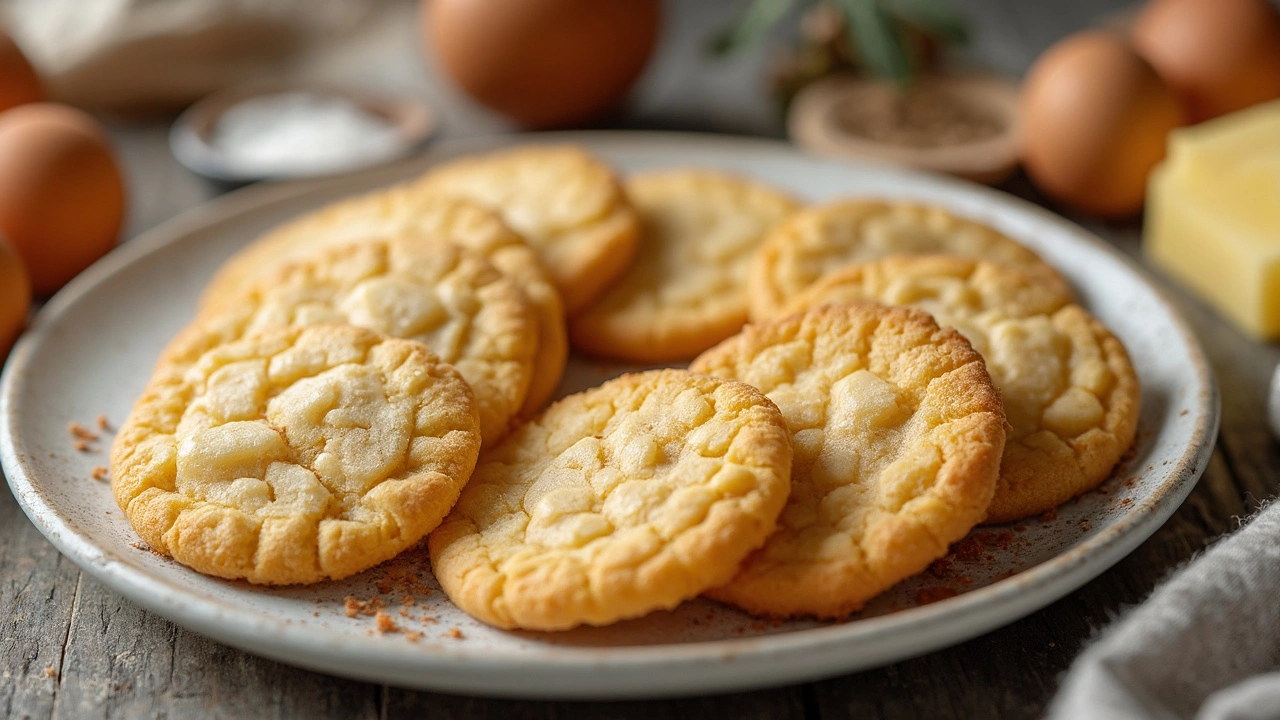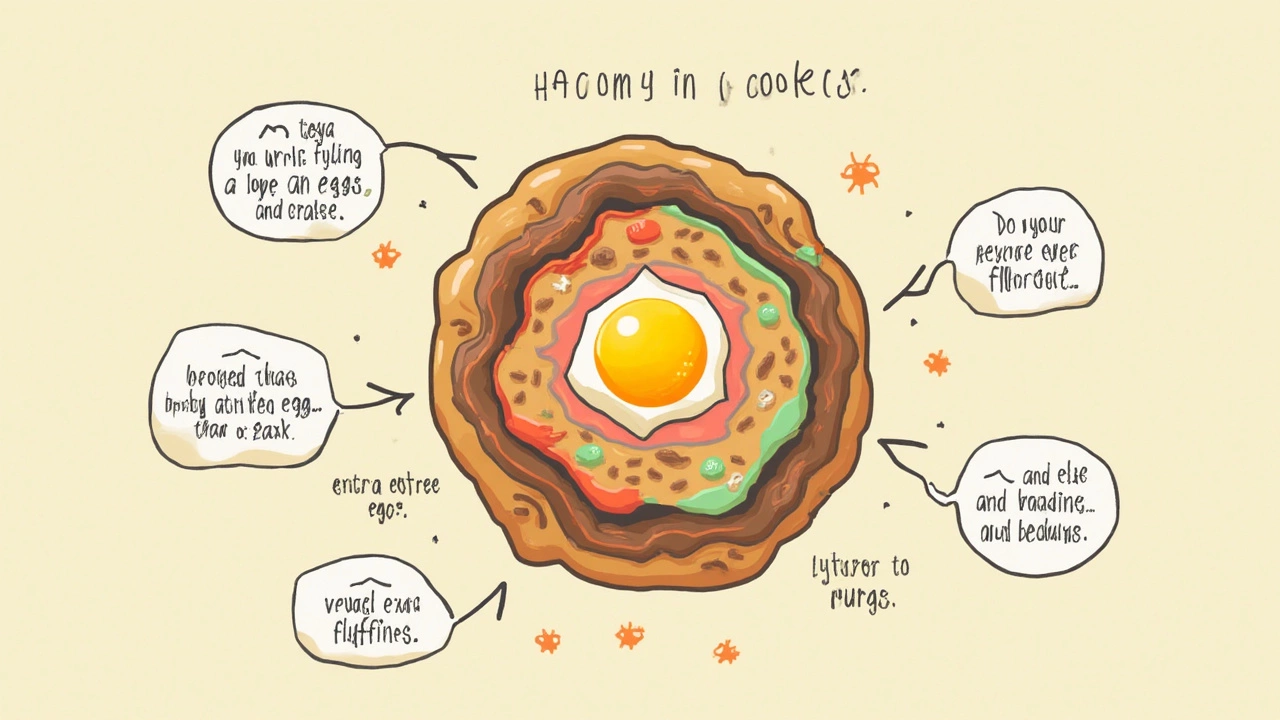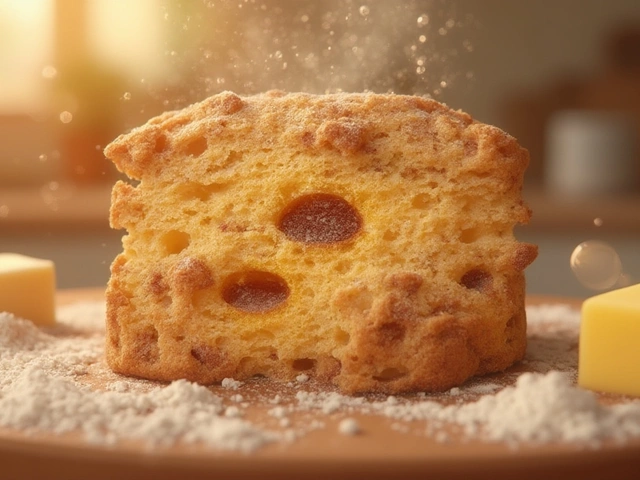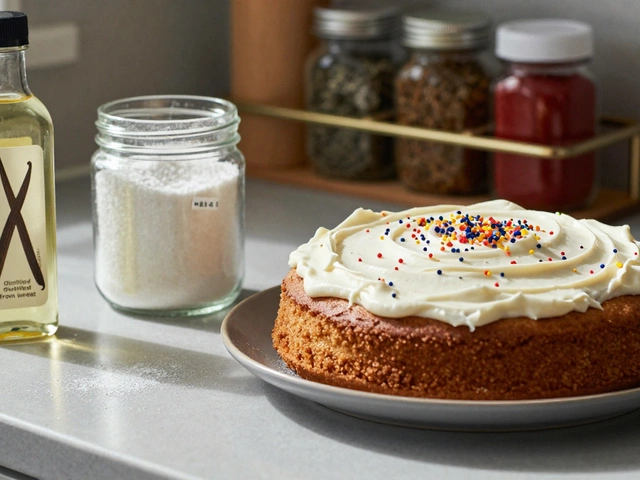
Ever baked cookies that turned out flat, dry, crumbly, or super dense? Sometimes, the answer is right there in the carton: eggs. Eggs do more than just combine ingredients—they totally change the game for your cookie dough. Without eggs, your cookies might not rise, spread, or even taste the way you expect.
It sounds simple, but the egg's job in cookies is chemistry at its tastiest. Eggs act as a binder, holding your dough together so you don't end up with a tray of sand instead of treats. But that's just the start. Ever notice that thick, chewy cookie texture everyone raves about? You can thank the eggs for that springy bite.
If you’re the curious type—or just tired of cookies that don’t turn out—knowing exactly how eggs work in your dough can save you a ton of trial and error. Next time Whiskers is circling the kitchen for a crumb, you’ll already know why some cookies get soft and others get crispy. Plus, you’ll be ready with swaps if you ever run out of eggs or need a vegan option.
- Why Eggs Matter in Cookies
- How Eggs Change the Texture
- Egg Substitutes That Actually Work
- Troubleshooting Common Egg Issues
Why Eggs Matter in Cookies
If you skip eggs in your homemade cookies, you'll notice the difference right away. Eggs pack a serious punch because they serve several roles at once. First, they work as a binder. That means the eggs hold all the ingredients together, stopping your cookie dough from falling apart when you scoop or roll it out. No one wants a mixture that turns to crumbs before it even hits the oven.
Eggs also bring moisture into the mix. Their water content makes sure your cookies don’t bake up dry or chalky. The fat in egg yolks helps keep cookies rich and soft, while the protein in the egg white adds structure, so cookies set up instead of spreading into sad puddles.
They even help with leavening. When eggs are beaten into dough, they trap air, setting up those tiny pockets that give a soft, cakey texture. If you’re after cookies that rise a bit and don’t turn into hard disks, eggs are your best friend.
- Eggs in cookies help them puff up and get chewy, not flat and tough.
- If you use whole eggs, you’ll get the best of both worlds: structure and richness.
- Too many eggs, and your cookies might be cake-like. Too few, and they could end up brittle.
Eggs even boost flavor, since a lot of key aromas and taste notes latch onto the fat in the yolks. Visually, eggs help with that perfect golden color. When you bake, the proteins and sugars in eggs brown up and form that classic cookie crust.
| Egg Part | Main Job in Cookies |
|---|---|
| Whole Egg | Binds, moistens, adds rise |
| Egg Yolk | Adds richness, soft texture |
| Egg White | Helps with lift and structure |
If you're ever tempted to leave out the egg in cookies just because you ran out, think again. Or get ready for a totally different batch than you expected. Next time you whip up a batch, remember: eggs don’t just fill space in the ingredient list—they’re the secret behind the magic.
How Eggs Change the Texture
So, what’s the magic trick behind eggs getting your cookies just right? It all comes down to what eggs do in the dough. They add moisture, help everything stick together, and give your cookies that addicting chewy bite. The yolk packs in fat and flavor, making cookies softer and richer. The white brings protein, which helps with structure and a bit of crisp on the edges. It’s a balancing act—leave one out, and the texture goes haywire.
Here’s the breakdown of how eggs impact cookie texture:
- Binding: Eggs hold the flour, sugar, and fat together. This prevents a pile of crumbs and gives every cookie a firm bite.
- Moisture: The natural liquid in eggs makes the dough less dry, so cookies stay moist in the center instead of turning rock hard.
- Leavening: Beating eggs into dough traps air and helps cookies rise slightly as they bake. This creates those little air pockets inside, so your cookies aren’t dense like bricks.
- Richness: The yolk adds fat, leading to a creamy, tender bite that feels luxurious—even in a humble chocolate chip cookie.
Ever wonder what happens if you swap out a whole egg for just yolks or whites? Using only yolks gives you extra softness, almost like a bakery shortbread. Whites, on the other hand, give structure but cut down on moistness, often making cookies a bit crisper. That’s why classic chewy cookies use whole eggs or throw in an extra yolk!
If you’re curious, check out how cookies change when you play with the egg ratio:
| Eggs Used | Texture Result |
|---|---|
| Whole egg | Chewy and balanced |
| Extra yolk | Super soft and rich |
| Egg white only | Drier and crispier |
| No eggs | Crumbly, dense, and dry |
So when you want the perfect chewy homemade cookies, don’t skimp on eggs. When recipes call for room temperature eggs, it’s not just fussy. Room temp eggs mix in better and give a smoother dough, which means fewer tough, overworked cookies. Next time you’re eyeballing that carton, remember: the egg is your ticket to awesome texture, every time.

Egg Substitutes That Actually Work
Sometimes you want to bake homemade cookies but you’re out of eggs. Or maybe you need a vegan batch for a friend. Good news: you don’t have to sacrifice flavor or texture if you grab the right egg swap. The trick is to pick a substitute that handles both the binding and moisture jobs eggs usually do in your cookie dough.
Here are some tried-and-true options that work well for eggs in cookies:
- Applesauce (Unsweetened): Use 1/4 cup applesauce to replace 1 egg. It keeps cookies moist and works great in chewy or cakey cookies. Beware, it can make cookies a bit denser and sweeter.
- Mashed Banana: 1/4 cup mashed ripe banana equals 1 egg. This adds moisture but you’ll get a hint of banana flavor—so best with chocolate or oatmeal cookies.
- Flaxseed Meal: Mix 1 tablespoon ground flaxseed with 2.5 tablespoons water, let it sit for 5 minutes, and you’ve got a "flax egg." It’s an easy vegan option and helps bind the dough, though it works best in cookies with hearty flavors or grains.
- Chia Seeds: Same trick as flax—1 tablespoon chia seeds + 2.5 tablespoons water. Wait for it to gel, then add. Chia gives a little crunch to the texture, which some people love in energy cookies.
- Commercial Egg Replacers: Things like Bob’s Red Mill or Ener-G use a blend of starches. Follow the box instructions and you’ll get a pretty close texture to classic cookies, especially if you want that classic chewy bite.
Wondering how these subs stack up in real life? Here’s how popular egg alternatives affect your cookies:
| Substitute | Best For | Texture Result |
|---|---|---|
| Applesauce | Chocolate chip, sugar cookies | Soft, moist, a bit cakey |
| Banana | Oatmeal, chocolate chunk | Dense, moist, banana-flavored |
| Flax/Chia | Oatmeal, spice, peanut butter | Hearty, binding, mild crunch |
| Egg Replacer | Any traditional recipe | Closest to standard egg texture |
Tip: If you’re making more than a single-egg swap, you might notice dough gets stickier or the cookies seem flatter. Always go small when switching out eggs in cookies—start with one, see how it bakes, then adjust for more.
Trying these subs? Keep an eye on your cookies as they bake and trust your nose. Some substitutes brown faster, so pull your tray out as soon as edges go golden. You won’t miss the eggs at all—with the right choice, your batch will still disappear fast. Whiskers probably won’t know the difference, either.
Troubleshooting Common Egg Issues
Messing up your eggs can mess up your whole batch of cookies. Seriously, even a small mistake—like using cold eggs or the wrong amount—can totally change the end result. Let's zero in on what goes wrong and how you can dodge those cookie disasters.
- Forgot to Add Eggs? Your dough will be dry, sandy, and impossible to work with. The cookies won’t spread or bind together. If you catch it before baking, just mix them in. If you baked already, chalk it up to a crunchy, accidental biscotti.
- Used Too Many Eggs? Expect a cakey texture instead of chewy. The cookies could puff up more and get spongy. Next time, grab a sticky note for your recipe.
- Eggs Straight from the Fridge? Cold eggs can make the butter in your dough solidify into clumps. Your cookies might not mix evenly, which leads to weird textures. Just pop eggs in a bowl of warm water for five minutes—it’s so much faster than waiting for room temp.
- Swapping in Egg Substitutes? Not every substitute gives the same results. Flaxseed eggs, applesauce, or commercial replacers each work differently. With flax eggs, expect denser cookies. Applesauce will bring softness but cuts into crispiness.
Check out this quick rundown on how egg substitutes stack up for homemade cookies:
| Substitute | Texture | Taste Impact |
|---|---|---|
| Flax "egg" (1 tbsp flax + 3 tbsp water) | Dense, chewy | Mildly nutty |
| Applesauce (1/4 cup per egg) | Soft, moist | Hint of apple |
| Commercial replacer | Varies | Neutral |
| Banana (1/4 cup per egg) | Cakey | Banana flavor |
If your cookies spread too much, you may have used large eggs instead of the standard "large" size most recipes call for. Too much liquid can make dough runny. Stick to large eggs or weigh your eggs if you want to be extra sure—one large egg weighs about 50 grams out of shell.
Finally, don’t forget about food safety. If you love sneaking raw dough (guilty), remember raw eggs can carry bacteria—use pasteurized eggs for safer snacking.





